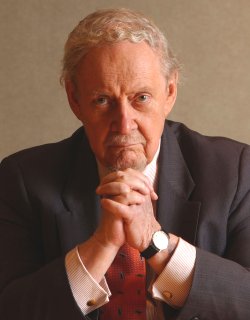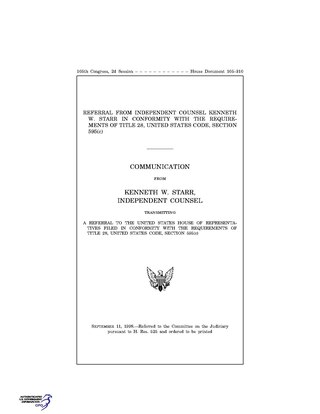
Monica Samille Lewinsky is an American activist and writer.

Kenneth Winston Starr was an American lawyer and judge who authored the Starr Report, which led to the impeachment of Bill Clinton. He headed an investigation of members of the Clinton administration, known as the Whitewater controversy, from 1994 to 1998. Starr previously served as a federal appellate judge on the U.S. Court of Appeals for the District of Columbia Circuit from 1983 to 1989 and as the U.S. solicitor general from 1989 to 1993 during the presidency of George H. W. Bush.

Robert Heron Bork was an American legal scholar who served as solicitor general of the United States from 1973 until 1977. A professor by training, he was later acting United States Attorney General and a judge on the U.S. Court of Appeals for the D.C. Circuit from 1982 to 1988. In 1987, President Ronald Reagan nominated Bork to the U.S. Supreme Court, but the Senate rejected his nomination after a contentious and highly publicized confirmation hearing.
The Whitewater controversy, Whitewater scandal, Whitewatergate, or simply Whitewater, was an American political controversy during the 1990s. It began with an investigation into the real estate investments of Bill and Hillary Clinton and their associates, Jim McDougal and Susan McDougal, in the Whitewater Development Corporation. This failed business venture was incorporated in 1979 with the purpose of developing vacation properties on land along the White River near Flippin, Arkansas.

The Clinton–Lewinsky scandal was a sex scandal involving Bill Clinton, the president of the United States, and Monica Lewinsky, a White House intern. Their sexual relationship began in 1995—when Clinton was 49 years old and Lewinsky was 22 years old—and lasted 18 months, ending in 1997. Clinton ended a televised speech in late January 1998 with the later infamous statement: "I did not have sexual relations with that woman, Ms. Lewinsky." Further investigation led to charges of perjury and to the impeachment of Clinton in 1998 by the U.S. House of Representatives. He was subsequently acquitted on all impeachment charges of perjury and obstruction of justice in a 21-day U.S. Senate trial.

Ann Hart Coulter is an American conservative media pundit, author, syndicated columnist, and lawyer. She became known as a media pundit in the late 1990s, appearing in print and on cable news as an outspoken critic of the Clinton administration. Her first book concerned the impeachment of Bill Clinton and sprang from her experience writing legal briefs for Paula Jones's attorneys, as well as columns she wrote about the cases. Coulter's syndicated column for Universal Press Syndicate appears in newspapers and is featured on conservative websites. Coulter has also written 13 books.

The Starr Report, officially the Referral from Independent Counsel Kenneth W. Starr in Conformity with the Requirement of Title 28, United States Code, Section 595(c), is a United States federal government report by Independent Counsel Ken Starr concerning his investigation of President Bill Clinton. Delivered to the United States Congress on September 9, 1998, the allegations in the report led to the impeachment of Bill Clinton and the five-year suspension of Clinton's law license.

Paula Corbin Jones is an American civil servant. A former Arkansas state employee, Jones sued United States President Bill Clinton for sexual harassment in 1994. In the initial lawsuit, Jones cited Clinton for sexual harassment at the Excelsior Hotel in Little Rock, Arkansas on May 8, 1991. Following a series of civil suits and appeals through the U.S. District Court and the U.S. Court of Appeals from May 1994 to January 1996, Clinton v. Jones eventually reached the United States Supreme Court on May 27, 1997. The case was later settled on November 13, 1998.

David Evan Kendall is an American attorney, a graduate of Wabash College, Yale Law School, and Worcester College, Oxford, who clerked with Supreme Court Justice Byron White, worked as associate counsel at the NAACP Legal Defense Fund, and has been a partner at Williams & Connolly LLP of Washington, DC since 1981, where he has provided legal counsel to individuals and corporations on high-profile business and political matters.
"Vast right-wing conspiracy" is a phrase popularized by a 1995 memo by political opposition researcher Chris Lehane and then referenced in 1998 by the then First Lady of the United States Hillary Rodham Clinton, in defense of her husband, President Bill Clinton, characterizing the continued allegations of scandal against her and her husband, including the Lewinsky scandal, as part of a conspiracy by Clinton's political enemies. The term has been used since, including in a question posed to Bill Clinton in 2009 to describe verbal attacks on Barack Obama during his early presidency. Hillary Clinton mentioned it again during her 2016 presidential campaign.
The White House FBI files controversy of the Clinton Administration, often referred to as Filegate, arose in June 1996 around improper access in 1993 and 1994 to FBI security-clearance documents. Craig Livingstone, director of the White House's Office of Personnel Security, improperly requested, and received from the FBI, background reports concerning several hundred individuals without asking permission. The revelations provoked a strong political and press reaction because many of the files covered White House employees from previous Republican administrations, including top presidential advisors. Under criticism, Livingstone resigned from his position. Allegations were made that senior White House figures, including First Lady Hillary Rodham Clinton, may have requested and read the files for political purposes, and that the First Lady had authorized the hiring of the underqualified Livingstone.

Bill Clinton, the 42nd president of the United States, was impeached by the United States House of Representatives of the 105th United States Congress on December 19, 1998, for "high crimes and misdemeanors". The House adopted two articles of impeachment against Clinton, with the specific charges against Clinton being lying under oath and obstruction of justice. Two other articles had been considered but were rejected by the House vote.
David Philip Schippers Jr. was an American lawyer from Chicago, Illinois. He received his bachelor's and law degrees from Loyola University Chicago. His most notable cases include prosecuting Sam Giancana, as well as being the chief investigative counsel during the Clinton impeachment trial.

Shadow: Five Presidents and the Legacy of Watergate is a 1999 book by Washington Post journalist Bob Woodward, written with a narrative voice while utilizing firsthand interviews and news reports for its historical basis. For the 608-page book, Woodward used extensive notes and also interviewed President Ford, President Bush's chief of staff, James Baker, and other people of focus.

Bill Clinton, the 42nd president of the United States (1993–2001), has been publicly accused of sexual assault and/or sexual misconduct by several women: Juanita Broaddrick accused Clinton of raping her in 1978; Leslie Millwee accused Clinton of sexually assaulting her in 1980; Paula Jones accused Clinton of exposing himself to her in 1991 as well as sexually harassing her; and Kathleen Willey accused Clinton of groping her without her consent in 1993. The Jones allegations became public in 1994, during Clinton's first term as president, while Willey's and Broaddrick's accusations became public in 1999, toward the end of Clinton's second term. Millwee made her accusations in 2016.

The impeachment trial of Bill Clinton, the 42nd president of the United States, began in the U.S. Senate on January 7, 1999, and concluded with his acquittal on February 12. After an inquiry between October and December 1998, President Clinton was impeached by the U.S. House of Representatives on December 19, 1998; the articles of impeachment charged him with perjury and obstruction of justice. It was the second impeachment trial of a U.S. president, preceded by that of Andrew Johnson.

Impeachment: American Crime Story is the third season of the FX true-crime anthology television series American Crime Story. It consists of 10 episodes and premiered on September 7, 2021. The season portrays the Clinton–Lewinsky scandal, subsequent impeachment of Clinton and is based on the book A Vast Conspiracy: The Real Story of the Sex Scandal That Nearly Brought Down a President by Jeffrey Toobin.

The impeachment inquiry against Bill Clinton, the 42nd president of the United States, was initiated by a vote of the United States House of Representatives on October 8, 1998, roughly a month after the release of the Starr Report.
During his presidency, Bill Clinton, the 42nd president of the United States, saw multiple efforts to impeach him.

Hillary Clinton served as the first lady of the United States from 1993 until 2001, during the presidency of her husband Bill Clinton.














